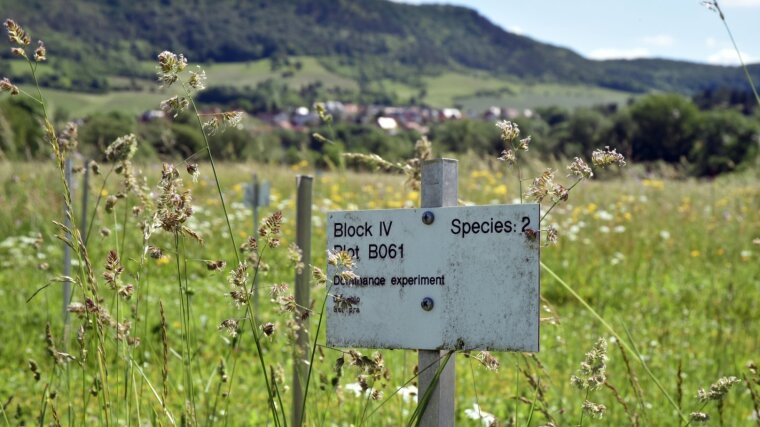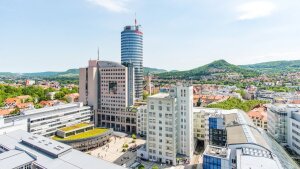
Scientific research fulfills important functions in dealing with the major challenges facing society today. It provides the basis for technological and social innovations and generates orientation knowledge that is indispensable for shaping complex transformation processes. In addition, researchers themselves drive change processes as socially relevant actors. Through the diverse - disciplinary as well as inter- and transdisciplinary - research activities of its members, Friedrich Schiller University contributes to answering societal questions about the future and is committed to strengthening the role of scientific knowledge and facts in societal debates.
Research projects related to sustainability
At Friedrich Schiller University, several faculties have research projects focusing on ecology, sustainable development and innovation, or the interface between sustainability and social justice.
To get a small insight into the sustainability-related research happening at the university, some of these sustainability foci and projects are listed below:
-
Faculty of Biological Sciences
Person working in laboratory between experimental equipment
Image: jarmoluk/pixabayThe Faculty of Biological Sciences at the University of Jena is currently not only part of the Cluster of Excellence "Balance of the MicroverseExternal link". It also hosts numerous projects directly related to sustainability.
- Emphasis on biodiversity research and microbial community behavior in response to disturbances
- Excellenzcluster Balance of the MicroverseExternal link
- German Centre for Integrative Biodiversity Research (iDiv) Halle-Jena-LeipzigExternal link
- Collaborative Research Center AquaDiva
- Collaborative Research Center The Jena ExperimentExternal link
- Collaborative Research Center ChemBioSysExternal link
- Graduate School Jena School for Microbial Communication (JSMC)External link
- Research focus Biodiversity and School, Science Education ( Prof. Hoßfeld de)
- Research and development of sustainable alternatives, green biotechnology (focus on cyanobacteria as cell factories). (Prof. ZedlerExternal link)
- Microbial pathogens from contaminated drinking water (Prof. Papenfort de)
- Reuse of heavy metal contaminated land through microbially supported cultivation of lignocellulose. (Prof. KotheExternal link)
- Understanding the microbiology of CO2 fixation mechanisms such as those found in seagrass beds, kelp forests, and permafrost. (Prof. Jogler de)
- Bioprocess development for natural products, also within the framework of a circular bioeconomy, e.g. use of cellulose as substrate; high-throughput microbiology in microfluidic droplets; electromicrobiology and bioelectrochemical systems, e.g. power generation from waste materials(Prof. Agler-Rosenbaum de)
- Impacts of climate change on biodiversity, including the establishment of the PhenObs network to monitor phenological changes in botanical gardens. (Prof. Römermann de)
- Melting of permafrost soils in Siberia (Prof. KüselExternal link)
- Plant-microorganism interactions in sustainable cultivation (Prof. Dr. Philipp Franken de)
- Emphasis on biodiversity research and microbial community behavior in response to disturbances
-
Faculty of Social and Behavioural Sciences
Bust of Friedrich Schiller in front of green background. On the right side of the picture are yellow flowers.
Image: Christoph Worsch (University of Jena)The term sustainability is often associated exclusively with its ecological component. Our researchers at the Faculty of Social and Behavioral Sciences ensure that the social perspective on the topic also receives attention at the University of Jena.
- Department Environmental sociology External link(Chair Prof. Dr. GroßExternal link)
- BMBF Junior Research Group Bioeconomy and Social Inequalities. Interlinkages and Interrelations in the Bioenergy Sector from a Transnational Perspective
- BMBF Junior Research Group Mentalities in Flux - Imaginaries in Modern Circular Bio-Based Societies (flumen)External link (Chair Dr. EversbergExternal link)
- UNESCO-Chair on Global Understanding for SustainabilityExternal link: Understanding one's own life in global social, economic and natural contexts (Global Understanding) as a starting point for a new understanding of sustainability and sustainable development. (Chair Prof. WerlenExternal link)
-
Faculty of Chemistry and Earth Sciences
orange catholyte and purple/pink anolyte in test tubes.
Image: Jan-Peter Kasper (University of Jena)Whether research on innovative energy storage, geothermal energy or the carbon cycle. The Faculty of Chemical and Geosciences is well-positioned when it comes to sustainability.
- Research on the " Critical Zone ", as a central link for global material and energy cycles. Research on the effects of the properties of the "Critical Zone" on the quality of our drinking water. Basic research as well as application-oriented projects in the fields of remediation and reclamation. In addition, research on soil and groundwater protection under the conditions of climate and landscape change (AG Prof. Kai Uwe TotscheExternal link). Prof. Totsche is also spokesman of the Thuringian Climate Council.
- Climate history and landscape evolution within the Quaternary (AG Prof. Dr. ZechExternal link). With the help of the work of Prof. Dr. Zech and his team, climate change can be better understood. Furthermore, the findings help to create better climate models in the future.
- Ecosystem research and investigation of material flows, material conversions and material storage in forest and agricultural ecosystems under changing environmental and usage conditions (AG Prof. Beate MichalzikExternal link)
- Investigation of interactions between terrestrial water cycle and vegetation (AG Prof. Anke Hildebrandt). Is involved in the SFB AquaDiva and the Jena Experiment, among others.
- Water technology, cavitation and renewable raw materials. (AG Prof. Michael Stelter)
- Consequences of climate change on society and politics as well as development of political and entrepreneurial strategies and concepts to deal with climate change.
(AG Prof. Sebastian HennExternal link) - Development of new (eco)toxicologically safe catalysts, (AG Jun.-Prof. Robert KretschmerExternal link)
- Research focus on energy storage (CEEC, AG Schubert AG Oschatz,External link AG BalducciExternal link)
- Optimization of building facades in the context of energy production. (AG WondraczekExternal link)
- Application of operational and experimental earth observation sensors in the optical, thermal, and microwave area (with emphasis on radar) for geoscience applications, land surface analysis in support of climate change issues. (Prof. SchmulliusExternal link)
- Impacts of climate and land use change on natural hazards and natural resources (including landslides, water resources, climate extremes). (Prof. BrenningExternal link)
- The (geological) history of the earth as well as paleoclimate/paleoecology (Prof. HeubeckExternal link)
- Disposal, e.g., bentonite long-term stability or transport and transfer behavior of long-lived radionuclides; geothermal energy (Prof. SchäferExternal link)
-
Faculty of Economics and Business Administration
Symbol photo statistics
Image: Jan-Peter Kasper (University of Jena)The economy represents one of the pillars in the three-pillar model of sustainability. The Faculty of Economics and Business Administration is, among other research areas, engaged in the research field of sustainable technologies in the changing political environment.
- Research on innovation and diffusion of sustainable technologies (renewable energies, e-mobility) and the influence of politics on these processes (Holger GrafExternal link)
- Research on Sustainable Marketing and Innovation (Prof. Dr. Nicolas ZachariasExternal link)
-
Faculty of Arts
An open book
Image: brandi redd / unsplashPhilosophy also deals with sustainability in its various dimensions. This includes, for example, the relationship human/nature.
- Ecocriticism Research CollectiveExternal link: A group of doctoral students working on the topic of Ecocriticism and examining topics such as sustainability, the human/nature relationship, the Anthropocene, etc. from a literary and cultural studies perspective.
- Research project "Hegel on natural and social sustainability" (Prof. Klaus ViewegExternal link). Prof. Vieweg is already retired, but still very actively connected with the Institute of Philosophy. Interested parties can contact him through his website.
Please note that the research projects presented here are only a selection of the research projects related to sustainability at the University of Jena. Further information on sustainable research topics can be found on the websites of the respective faculties.
-
ThINK
The Thuringian Institute for Sustainability and Climate Protection (ThINKExternal link) provides comprehensive research, planning, consulting and educational services in Germany and abroad in the fields of climate (climate protection, climate change and climate change adaptation, urban climate ...), energy (renewable energies, energy efficiency ...), satellite- and UAV-based remote sensing as well as the broad field of sustainability (e.g. CO2 balancing and compensation).
-
Earth Oberservation Service GmbH
E|0|SExternal link is a pioneer in operational processing of active microwave remote sensing data for mapping forest biomass and other forest-related biophysical parameters that are important for sustainable forest management. In addition, other innovative services are offered, covering a broad spectrum from the analysis of all types of remote sensing data to the development of digital training content.
-
Alpha Analytics UG & Co. KG
The Alpha AnalyticsExternal link team is active in the field of DataScience and is highly experienced in the processing and analysis of data in an industrial environment. In particular, machine learning and multivariate analysis methods are used to identify complex relationships in data and, based on this, to make predictions, for example, about the health of machines or the quality of products.
-
WINNER-Verbundprojekt
WINNERExternal link is the implementation approach of an energy-grid-neutral electromobility integrated into the objectives of the housing industry (WoWi). It combines local, renewable energies in the housing properties, their use as energy supply in the neighborhood (also referred to as tenant electricity) and the promotion of commercial and private electromobility through the intelligent use of excess capacities, load fluctuations and grid status of both the local and the public power grid.
-
The Jena Declaration
The Jena Declaration. Cultural and regional dimensions of global sustainability
The Jena Declaration (TJD) calls for double radical change of paradigm in sustainability research and policies. First, from an ecology to a culture centered approach. With our bodies, we are part of nature. Therefore, nature is not our environment. The way we act as nature depends always on our cultural background, and the regional context. This leads to the call for paradigmatic change of from top-down to bottom-up approach. More information under: https://www.thejenadeclaration.org/External link




